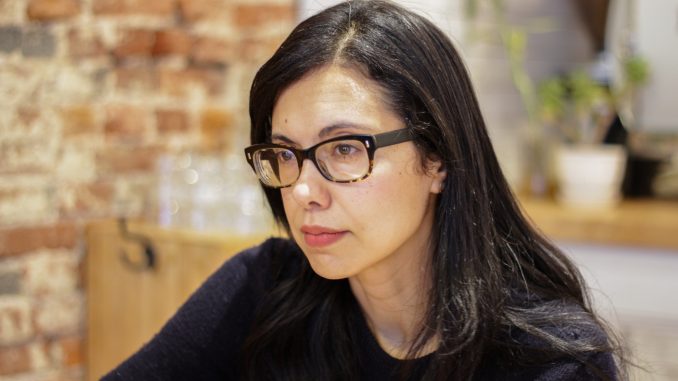
When Heidi Saman finished graduate school, she was nervous.
Her anxiety partially had to do with entering the workforce at the beginning of the 2008 recession — one of the largest declines in economic activity since the Great Depression.
But it also had to do with being a first-generation American.
“I was so worried that I wasn’t going to be employable,” said Saman, whose parents are from Egypt. “I really felt like I couldn’t pursue filmmaking immediately, and I felt like I had to be an employed person that would make my parents happy.”
Saman, a 2007 master’s of film and media arts alumna, directed, wrote and produced “Namour,” a film that discusses the concept of feeling stuck through the perspective of an Egyptian-American named Steven, who works in Los Angeles as a valet driver. It premiered at the Los Angeles Film Festival in June 2016 and made its Netflix debut on March 15.
“Namour” also received assistance from Array, an organization that produces films by women of color and helps get them into theaters and on viewing platforms. It was started by Ava DuVernay, a filmmaker known for “13th,” a Netflix documentary about mass incarceration in the U.S.
The collective helped get her film on Netflix and shown in cities across the U.S., including at a West Philadelphia art space in the former United Bank building in early March.
Saman’s film — which won the LA Muse Award at the festival — was shot in Los Angeles in September 2014 over the course of 18 days.
The idea for the film came from Saman’s fears of finding a job in the middle of the recession.
Saman said she wanted the film to capture the feelings of other people she knew in her 20s, including some “peculiar fellows” she dated then, who were also fearful about their employment prospects.
“What would happen to someone if that temporary job started to feel like it was not so temporary?” Saman said. “So that is how Steven came to be.”
Steven, who is played by Karim Saleh, was molded through some of Saman’s own experiences. Both of them grew up in Southern California and have parents from Egypt, but he has key differences, like being a valet driver. Saman added that her film professors at Temple encouraged students to write from spaces they know. For her, it was as a first-generation American.
Parts of the film were also shot in her childhood home, which has since been sold. Saman said it’s a good, lasting memory of that part of her life.
In “Namour,” there isn’t a big moment of action. But that doesn’t mean there isn’t a sense of rising action or a climax.
Throughout the film, Steven has trouble expressing the feeling of being stuck, while his sister succeeds in her educational pursuits. Saman said it was hard to create scenes that explored the ideas of repressed emotions.
“How do you convey that emotiveness through wordlessness?” Saman said. “Can you make a film about stasis, about being stuck? Can you make that beautiful? And so a lot of that relied on my actor Karim, who I think did such a good job at suppressing something that kind of keeps building.”
One particular scene includes Steven sitting on the beach in the evening, drunk at a party with friends and texting his girlfriend during his mental breakdown. He then goes back over to his friends and puts his hand in the bonfire, injuring himself. But throughout this breaking moment, he doesn’t say a word.
She said scenes like this go “against the grain,” but it was an interesting way to convey the emotions happening inside his head.
Mark Tumas, a 2013 film and media arts alumnus, was the film’s post-production editor. Tumas said his experience on “Namour” was the biggest project he had worked on yet.
“I learned a lot of patience from [Saman] and she left no option in the edit unturned, so every possible combination of scenes and cuts, we probably looked at,” he said. “She taught me a lot about picking performance from the actor and finding the rhythm of the film.”
Prior to her time at Temple, Saman received her undergraduate degree in world literature and gender studies from the University of California San Diego in 2001. She then left in August 2001 to work in the public relations department at the American University in Cairo for a year.
She said coming back to the U.S. was difficult. Since she left for Egypt three weeks before 9/11, Saman came back to a completely different country.
Saman longed for the hustle of Cairo after moving back to her family’s suburban Orange County town. Because of that, coming to Philadelphia in 2003 was “oddly comforting.”
Saman decided to go back to Egypt to film her master’s thesis in 2007, “The Maid,” which premiered in competition at the 2008 Cannes Film Festival. The film won a Princess Grace Honorarium Award for Thesis Film. The Princess Grace Foundation is a New York City nonprofit that assists emerging artists through grants and scholarships.
As of now, Saman works as an associate producer on NPR’s Fresh Air with Terry Gross — a weekday radio show on contemporary art and social issues — but she said she’s also working on her next feature script and a television script.
Saman said working with Array gave her an “incredible chance” to showcase her work.
“I think to change the way things have been going, you have to create your own cannon and you have to give people chances,” Saman said. “They get what the film is and they get the ethos of the people who made it. It just feels right and it feels that the film has a home.”
Emily Scott can be reached at emily.ivy.scott@temple.edu or on Twitter @emilyivyscott.


Be the first to comment